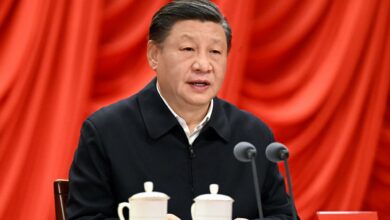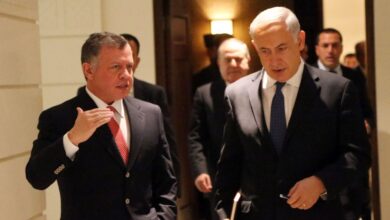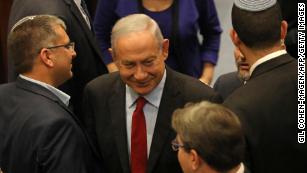In anticipation of today’s meeting between President Hosni Mubarak and Israeli Prime Minister Benjamin Netanyahu, papers ran related items on their front pages. But the pre-meeting news items were played out quite differently by various papers.
The state-run Al-Ahram opened with a long piece of condemning Netanyahu propaganda, which to some extent reflects the alleged rising tension between the two leaders. The paper started by highlighting coverage from Netanyahu’s visit to Washington, a meeting whose purpose was to renew the on-going bond between the two countries. Al-Ahram references a 2001 Israeli television broadcast in which Netanyahu, speaking on US-Israeli relations, asserts that Israel is capable of directing the politics of the US. Al-Ahram reports that the White House found these statements “annoying.” In the video, Netanyahu also prides himself for weakening the Oslo Accords, which were supposed to bring peace to the region and contribute to the establishing of a Palestinian state institution. Al-Ahram also mentions the US commitment of US$30 billion in military aid to Israel, allegedly the biggest pledge to date from the US to Israel. The piece features a photograph of anti-settlement protests, perhaps to recall Netanyahu’s policies which have been conducive to settlement expansion. The half-page long piece does not reference today’s meeting between Mubarak and Netanyahu. Yet it evokes discussion of tension between the two leaders.
State-run Rose el-Youssef prints a rather ominous pre-meeting curtain raiser, with a headline that reads, “Is it the last chance?” The story mentions that Mubarak will meet with Netanyahu, Palestinian President Mahmoud Abbas, and American Mideast Peace Envoy George Mitchell. The meetings will be held separately, with no intention to put the leaders together. The news item finishes with Abbas’s previous comments that if this attempt to renew peace talks fails, he will reconvene with fellow Arab leaders in September to go to the Security Council and call for the establishment of a Palestinian State.
State-run Al-Akhbar runs the standard “Mubarak meets Abu Mazen, Mitchell, and Netanyahu today to look into ways of moving the peace process forward.” In a shorter news item on the front page, the paper reports that the meeting will consider ways of moving the peace process ahread, and discuss the proposition to separate the Gaza Strip as suggested by Israeli Prime Minister Avigdor Lieberman.
The privately-owned Al-Dostour voices some criticism of Mubarak. The far top bar of the paper reads, “Why do we not know what Mubarak will tell Netanyahu in closed room.” And it stops there; a common Al-Dostour editorial strategy to make strong statements. Further down, in the slot allocated to the daily editorial by the paper’s chief editor Ibrahim Eissa, the headline reads, “Netanyahu’s meeting minutes.” In the editorial, Eissa addresses the question of presidential accountability, asserting that we won’t know exactly what happened between Netanyahu and Mubarak, not even in 30 years. In contrast, the Israeli people will know the details of the meeting, primarily because Netanyahu will return and report to his cabinet. “But in our country, no one can hold the president accountable or question him…The president in Egypt does what pleases him and the cabinet only follows as a secretariat whose sole responsibility is to implement what the president orders. Eissa also reminds us that the parliamentary committee assigned to deal with Arab affairs and national security issues will also be ignorant of the deliberations between Mubarak and Netanyahu, which is to be expected from a parliament that doesn’t necessarily represent the people. He ends by saying, “The bottom line is that Israel and America consider Mubarak the most important president in the universe for them,” reversing the suggestions of a tension between Mubarak and Netanyahu pitched by state-run papers.
Al-Ahram: Daily, state-run, largest distribution in Egypt
Al-Akhbar: Daily, state-run, second to Al-Ahram in institutional size
Al-Gomhorriya: Daily, state-run
Rose el-Youssef: Daily, state-run, close to the National Democratic Party’s Policies Secretariat
Al-Dostour: Daily, privately owned
Al-Shorouq: Daily, privately owned
Al-Wafd: Daily, published by the liberal Wafd Party
Al-Arabi: Weekly, published by the Arab Nasserist party
Youm7: Weekly, privately owned
Sawt el-Umma: Weekly, privately owned




